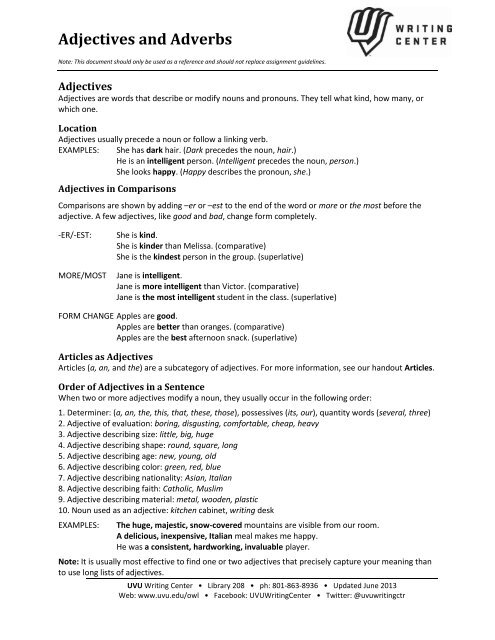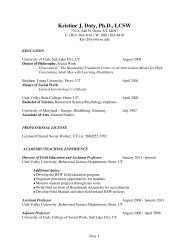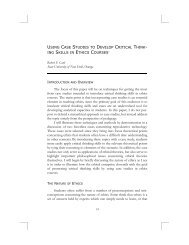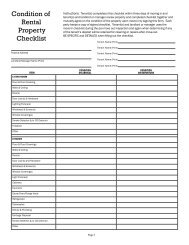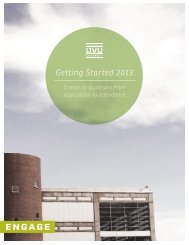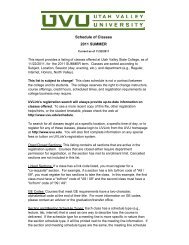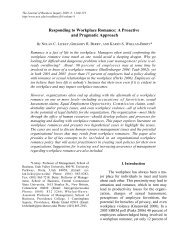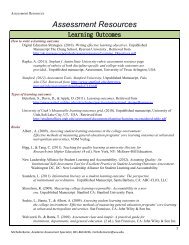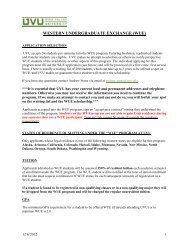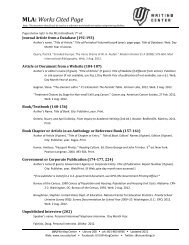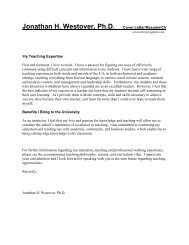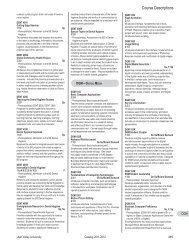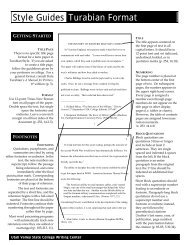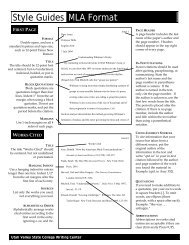Adjectives and Adverbs - uvu.edu
Adjectives and Adverbs - uvu.edu
Adjectives and Adverbs - uvu.edu
You also want an ePaper? Increase the reach of your titles
YUMPU automatically turns print PDFs into web optimized ePapers that Google loves.
<strong>Adjectives</strong> <strong>and</strong> <strong>Adverbs</strong>Note: This document should only be used as a reference <strong>and</strong> should not replace assignment guidelines.<strong>Adjectives</strong><strong>Adjectives</strong> are words that describe or modify nouns <strong>and</strong> pronouns. They tell what kind, how many, orwhich one.Location<strong>Adjectives</strong> usually precede a noun or follow a linking verb.EXAMPLES: She has dark hair. (Dark precedes the noun, hair.)He is an intelligent person. (Intelligent precedes the noun, person.)She looks happy. (Happy describes the pronoun, she.)<strong>Adjectives</strong> in ComparisonsComparisons are shown by adding –er or –est to the end of the word or more or the most before theadjective. A few adjectives, like good <strong>and</strong> bad, change form completely.-ER/-EST:MORE/MOSTShe is kind.She is kinder than Melissa. (comparative)She is the kindest person in the group. (superlative)Jane is intelligent.Jane is more intelligent than Victor. (comparative)Jane is the most intelligent student in the class. (superlative)FORM CHANGE Apples are good.Apples are better than oranges. (comparative)Apples are the best afternoon snack. (superlative)Articles as <strong>Adjectives</strong>Articles (a, an, <strong>and</strong> the) are a subcategory of adjectives. For more information, see our h<strong>and</strong>out Articles.Order of <strong>Adjectives</strong> in a SentenceWhen two or more adjectives modify a noun, they usually occur in the following order:1. Determiner: (a, an, the, this, that, these, those), possessives (its, our), quantity words (several, three)2. Adjective of evaluation: boring, disgusting, comfortable, cheap, heavy3. Adjective describing size: little, big, huge4. Adjective describing shape: round, square, long5. Adjective describing age: new, young, old6. Adjective describing color: green, red, blue7. Adjective describing nationality: Asian, Italian8. Adjective describing faith: Catholic, Muslim9. Adjective describing material: metal, wooden, plastic10. Noun used as an adjective: kitchen cabinet, writing deskEXAMPLES:The huge, majestic, snow-covered mountains are visible from our room.A delicious, inexpensive, Italian meal makes me happy.He was a consistent, hardworking, invaluable player.Note: It is usually most effective to find one or two adjectives that precisely capture your meaning thanto use long lists of adjectives.UVU Writing Center • Library 208 • ph: 801-863-8936 • Updated June 2013Web: www.<strong>uvu</strong>.<strong>edu</strong>/owl • Facebook: UVUWritingCenter • Twitter: @<strong>uvu</strong>writingctr
<strong>Adjectives</strong> <strong>and</strong> <strong>Adverbs</strong>Note: This document should only be used as a reference <strong>and</strong> should not replace assignment guidelines.<strong>Adverbs</strong><strong>Adverbs</strong> describe verbs, other adverbs, <strong>and</strong> adjectives, as well as whole clauses.Use of <strong>Adverbs</strong><strong>Adverbs</strong> often answer the questions Where?, When?, How?, <strong>and</strong> To what extent?.EXAMPLES:He wrote nearby. (Where did he write? Nearby.)He wrote yesterday. (When did he write? Yesterday.)He wrote carefully. (How did he write? Carefully.)He wrote a draft that was almost complete. (To what extent? Almost complete.)Formation of <strong>Adverbs</strong><strong>Adverbs</strong> are often formed by adding the suffix-ly to an adjective.EXAMPLES:Unfortunately, she left differently than he did.She quickly picked up the book <strong>and</strong> curiously began reading it.Some adverbs are not derived from adjectives.EXAMPLES:Ryan liked Engl<strong>and</strong> a lot.The dog was fat because it loved food so much.The author writes well.Choosing <strong>Adjectives</strong> <strong>and</strong> <strong>Adverbs</strong>Students sometimes use an adjective where an adverb is needed, or vice versa. Remember thatadjectives modify nouns <strong>and</strong> pronouns, <strong>and</strong> adverbs modify verbs, adverbs, or other adjectives.INCORRECT:CORRECT:INCORRECT:CORRECT:Br<strong>and</strong>on <strong>and</strong> Melissa took the joke too serious. (Serious is intended to modify took, soan adverb—seriously—is needed in its place.)Br<strong>and</strong>on <strong>and</strong> Melissa took the joke too seriously.I performed good on the test. (Good is intended to modify the verb performed, so anadverb—well—is needed in its place.)I performed well on the test.In some instances, your choice of an adjective or an adverb changes the meaning of the sentence.EXAMPLES:The dog smells bad. (This sentence is saying that the dog stinks.)The dog smells badly. (This sentence is saying that the dog has a poor sense of smell.)UVU Writing Center • Library 208 • ph: 801-863-8936 • Updated June 2013Web: www.<strong>uvu</strong>.<strong>edu</strong>/owl • Facebook: UVUWritingCenter • Twitter: @<strong>uvu</strong>writingctr


